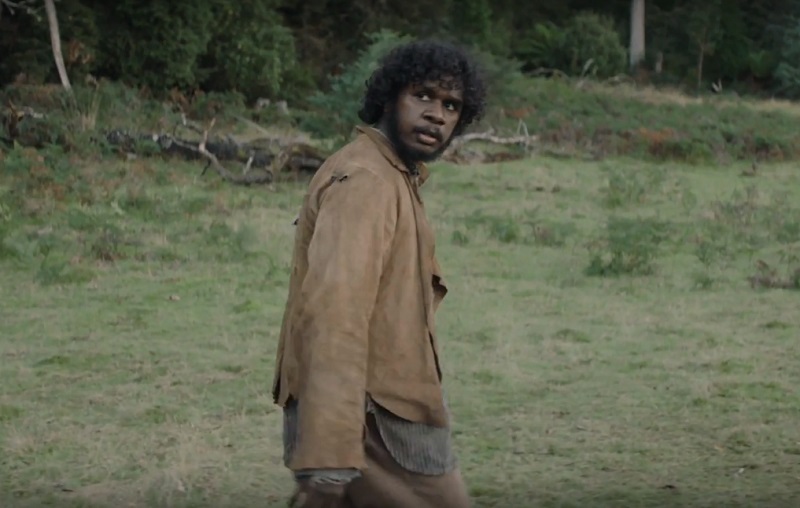Australia/Canada/US | 2018 | Directed by Jennifer Kent
Logline: A young Irish woman, working in an Australian penal colony, experiences great trauma at the hands of a British Officer and subsequently sets out an arduous revenge mission.
It is 1825 on the Australian island known as Van Diemen’s Land (which would become the state of Tasmania some thirty years later). It is the country’s primary penal colony. Clare (Aisling Franciosi) is a young Irish convict under the parole supervision of British Lieutenant Hawkins (Sam Claflin), who is brown nosing for a promotion. He wields his power over Clare with brutality and humiliation, raping her in his office, after she sings for his men.
Clare has been allowed to marry an Irish convict, Aidan (Michael Sheasby), and they dwell in a tiny cabin with their infant baby, but she wants out, having served more than enough time. She lies to her husband about the assault, but Aidan senses her fear, and he is determined to set them both free. Aidan drunkenly confronts the Lieutenant which results in Hawkins being severely reprimanded by his superior, and in his anger the officer and two of his cronies, Ruse (Damon Herriman) and Jago (Harry Greenwood) storm Clare and Aidan’s cabin where sickening, murderous hell is unleashed.
In the horrific aftermath Clare, left for dead, is blinded by abject grief, desperation and rage. With just her husband’s horse and musket, she enlists a reluctant young Aboriginal tracker, Billy (Baykali Ganambarr), to help her pursue the Lieutenant and his men, who have set off through the dense bush on a journey to the next township.
In the traditional modern horror world The Nightingale would fit into the sub-genre known as the rape-revenge flick, but Jennifer Kent’s follow-up to The Babadook is not a traditional horror movie, more of a drama with thriller aspirations, that is steeped in the black water of horror. This is the kind of contemporary take on a genre movie some critics would add the word “elevated” to, trying to shine a lofty ray of respectability into the coal black darkness at its core. But, the truth of the matter is, The Nightingale is, essentially, a horror movie in a historical setting. It is the nightmare journey Clare undertakes, pulling hapless Billy into her injured fold, as she grapples with hatred and retribution.
Kent has said she was compelled to make the movie as a response to the frequent violence she was seeing on the news. She felt the ghastly truths about Australia’s colonial past, in particular the rampant misogyny and racism, needed to be illustrated, and as such she wrote a fictional tale embedded with these horrendous details. She describes The Nightingale as a movie about love and compassion, and that if the film was just about violence she wouldn’t have made it.
I feel Kent is being somewhat disingenuous, especially as the movie indulges in its depiction of horror, and eventually languishes in it. The movie is undoubtedly a study of violence and hatred. Any love and compassion is buried deep, almost out of reach. Clare’s mission is a two hour journey of misery and despair, grim as coffin nails, bleak as an Arctic winter, with hope a candle in the cold hard wind.
Clare eventually abandons her husband’s weapon - but not before she demolishes one of the soldier’s faces with repeated blows from the musket’s butt - and takes on a fragile, ruined sense of resignation, but by that stage her accomplice, Billy, has been psychologically damaged, pushed to the same edge of the abyss. To further the tragedy it is Billy who will complete her mission, at mortal cost.
Kent has elicited a powerful performance from Franciosi in the lead role. The rest of the cast are solid, although I wasn’t entirely convinced with Gunumbarr, in his acting debut. The curious choice of shooting in the old-fashioned standard (or Academy) ratio (1.33:1) creates both a sense of claustrophobia, but, combined with the accents, costumes, and muted cinematography, I was reminded of the New Zealand docudrama television series of the late 70s, The Governor. This was probably not intended, but it gave the movie an unshakeable theatricality.
The inherent nihilism and revenge premise of The Nightingale paints a picture that would work very well with the suspense structure of a more traditional horror movie, but Kent doesn’t want to be recognised as a director of horror. Instead she depicts the atrocity of sexual violence and systematic annihilation of the indigenous people as a reminder of where we’ve come from, and the real dark truth is that little has changed.
Kent’s intention feels confused. The movie is ill-paced, the narrative drifting, meandering along, and then seemingly rushing toward a climax that fails to deliver properly what the audience will be demanding, especially considering what they’ve been subjected to. It sets up a potentially explosive climax, only to stumble toward its denouement and finally collapsing in a heap. Shifting Clare’s story to Billy’s in the final act fails as we’ve not been given enough back story to Billy to warrant his decision to embrace Clare’s fading vengeance.
Kent could’ve made a truly powerful horror movie, one covered in the dark blood of rage, resonant in the kind of wholly retributive way the most memorable rape-revenge movies are, but instead The Nightingale becomes a harrowing ordeal without justice properly served, without the dramatic climax it demands. There’s no real hope in that. There’s certainly no satisfaction.





